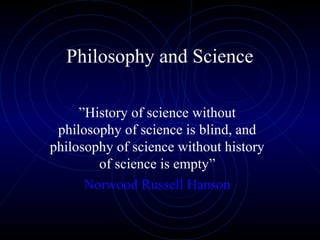
Philosophy of science
- 1. Philosophy and Science ”History of science without philosophy of science is blind, and philosophy of science without history of science is empty” Norwood Russell Hanson
- 2. Science and philosophy • Science: Systematized knowledge covering general truths as tested through scientific method. • Philosophy: The study of the most general features of the world and the categories with which we think.
- 3. What’s science? You have question about • What is mass? • What is electric charge? • What is energy? • What is infinity? • How do I measure ? 2
- 4. Philosophy of Science What are the aims of science? Science is the study of alternative explanations. What is an explanation? An explanation is an answer to the question, Why does that happen? An explanation is also called a “theory.”
- 5. Why philosophy of science ? • To think is also to ponder. • To ponder is also to self-reflect: • Why do I do what I do? • Do I do it the right way? • Is it good for me and others? Could it be better? • Do research make understand the world • Humankinds only hope for survival.
- 6. Philosophy of science • Philosophy of science are deeply connected with other philosophical problems • Metaphysics: do the objects of scientific research exist independently of us • Epistemology: what is scientific knowledge? • Logic: what is (valid) scientific inference like? • Philosophy of language: do scientific theories are theories true or false. • Ethics : is science value-free or social problems do science involve?
- 7. Romanticism Explanation: • Only theory describing subjective motives can “explain” conscious human action. • Motives are the causal factors identified in “theoretical” explanations.
- 8. Idealism vs realism • Plato: The only reason we can’t perceive it is because our senses are limited and deceptive. • Aristotle: What we see is what is real. There is only one signal. To say otherwise is mere speculation. It is absurd to say the bandwidth is infinite because infinity does not really exist. It is merely a ‘becoming’. The form of a thing changes to a new form, and this becoming is called enérgeia.
- 9. Comte’s positivism founder of sociology; one of the ”systems builders” of the 19th C. The positive is: •is real not-imagined •is useful skeptic on armchair philosophy •is certain beyond discussion. •the idea of enlightenment and belief in progress •a historical tendency towards unity of all sciences •focus on science as a product
- 10. Pragmatism • Explanations contain laws from which descriptions of concrete events are logically derived. • Laws are former theories that have been tested and not falsified.
- 11. Logical positivism logical positivism’s favorite philosophy of language •Language has a logical structure •What is meaningful = what is verifiable •Metaphysics is considered as meaningless) •Deductive logic as a guaranty of truth. •mirror-relation between theories and facts. •the world is ultimately of a physical nature. A. Comte (1798-1857)
- 12. Naturalism and relativism • Naturalism: ”there is no first philosophy” – no autonomous philosophical perspective over and above science itself (W.V. Quine). • Naturalism challenges the traditional normative nature of the philosophy of science: the norms of scientific research cannot be established from outside science. • Relaltivism :Paul Feyerabend: ”anything goes!
- 13. Computational philosophy of science • The development of computerized discovery new systems and the past achievements of successful scientists, in order to develop a new description one or several new theories. • It is the design, development and application of computerized discovery systems that mechanize the productive research practices • Cognitive psychology approach. Artificial intelligence. • Linguistic analysis approach.
- 14. Computational Cognitive psychology approach: Computer systems are hypotheses about human problem-solving processes. Linguistic analysis approach: Computer systems are language processing systems, viewed instrumentally. No psychological claims are made about intuitive thinking processes.
- 15. No, really. What is this? Psychology as we know it had to wait until the beginning of the 20th century, and computer science is an infant—only a little more than 50 years old! And psychology descends from philosophical reflection on the nature of the mind and its properties, i.e. the philosophy of mind. Computer science, for its part, stems from philosophy’s millennium long interest in logic Interestingly, all of these sciences grew from philosophical roots.
- 16. Science and technology episteme (knowledge) vs. tekhne (skill). • Technology: tekhne + logos, ”the study of skills”.? • Science requries a technological context. • Tecnology is any tools intelligently used to promote human purposes are technological – including, e.g., language. •Philosophy of technology studies the nature of our technological culture that continusosly connected with social change.
- 17. Modern philosophies • Romanticism. • A philosophy for social and cultural sciences. • Positivism. • A philosophy for all sciences based on Newtonian physics. • Contemporary pragmatism. • A philosophy for all empirical sciences. • Computational cognition • A philosophy for cognitive and computer science.
- 18. Function • Aim of Science. • The institutionalized aim of basic research. • Discovery. • Development of new theories. • Criticism. • Criteria for evaluating theories. • Explanation. • Scientific explanation - the final result.
- 19. Influence of Philosophy Scientists who have engaged in philosophy of science: •Marx’s theory of history •Freud’s psychoanalysis •Einstein’s theory of relativity •Sir Isaac Newton ‘s gravitational force •Aristotle •Galileo’s telescope •Copernican revolution •Spencer :Coined “Survival of the Fittest” •Darwin ‘s evolution theory
- 20. Natural PHILosophy On some accounts, something like science emerged among the ancient Greeks in Miletus around 650 BCE. There a group began to ask: What is everything made of ? Thales: Everything is made of water Anaximander:Everything is made of “the boundless Anaximenes: Everything is made of air Democritus: Everything is made of atoms Pythagoras : Everything is made of numbers
